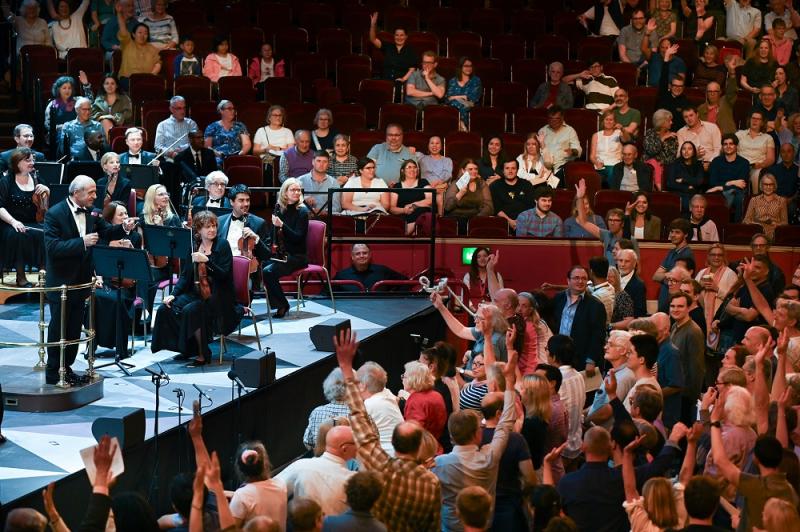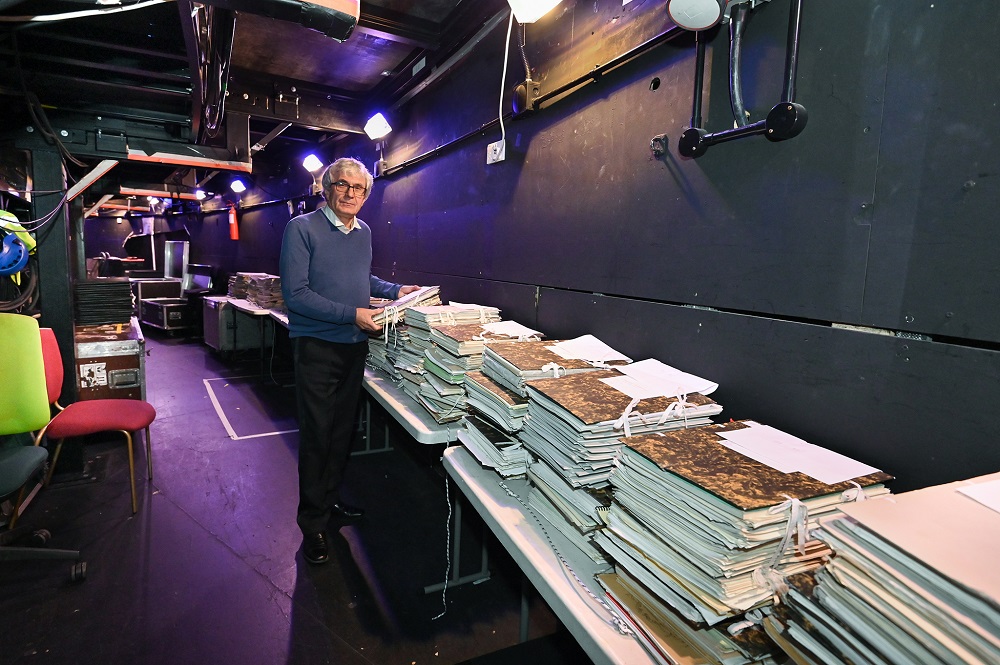Prom 38: Audience Choice, Budapest Festival Orchestra, Fischer 2 review - true democracy or tricksy referendum? | reviews, news & interviews
Prom 38: Audience Choice, Budapest Festival Orchestra, Fischer 2 review - true democracy or tricksy referendum?
Prom 38: Audience Choice, Budapest Festival Orchestra, Fischer 2 review - true democracy or tricksy referendum?
Ambitious aim to make up a symphony of four different movements doesn’t quite succeed

It would be worth travelling a long way to hear the Budapest Festival Orchestra giving such a lithe, athletic performance under its founder and Music Director Iván Fischer of Glina’s Ruslan and Lyudmila Overture. That was the Radio 3 and Proms Audience Choice from 19 overtures and preludes whittled down to three. What happened next, despite some equally lustrous playing, didn’t always work so well.
What was I expecting? A banquet of the kind of pieces you don’t often get in a conventional concert – ballet music, operatic preludes and intermezzi, tone poems of up to 20 minutes in length. There were in fact nearly 100 of these on offer in the "encores" section, from a full list of 275 works BFO librarian and violinist Tibor Gátay (pictured below with the scores backstage at the Royal Albert Hall) had apparently at the ready. That could also have upped the quotient of women composers (there was only one on the entire list, Fanny Hensel). But the main idea, to put together a symphony of four movements from different works, brought problems with it.  Three seat numbers were read out (Prommers got their moment eventually when Fischer threw a beach ball into the Arena); the three choices were put to the hands-up-and-shout vote; and while the chosen work’s parts were distributed among the players, we heard a series of chamber-musical and folk divertimenti – the most charming part of the afternoon. They included conventional sweetness in the first of Shostakovich’s Five Pieces for Two Violins and Piano, klezmer and Hungarian folk music, a Monteverdi madrigal with singing from some of the players and two spellbinding improvisations.
Three seat numbers were read out (Prommers got their moment eventually when Fischer threw a beach ball into the Arena); the three choices were put to the hands-up-and-shout vote; and while the chosen work’s parts were distributed among the players, we heard a series of chamber-musical and folk divertimenti – the most charming part of the afternoon. They included conventional sweetness in the first of Shostakovich’s Five Pieces for Two Violins and Piano, klezmer and Hungarian folk music, a Monteverdi madrigal with singing from some of the players and two spellbinding improvisations.
So why am I going to be curmudgeonly about the symphonic choices? Because radio schedules mean timings can’t run over too much, and only imagine what would have happened if the main choices had been the first movement of Mahler 9, the Andante con moto of Schubert 9, the Presto of Beethoven 7 and the finale of Brahms 4. As it was, the first choice – the fateful opening movement of Tchaikovsky 4 – already ran to 18 minutes, though it was enlightening to hear Fischer’s febrile way with it, including hair-raising tremolos in the final tragic statement. The second movement was bound to be shorter, between two Haydn charmers (the “Hen” and the “Oxford” symphonies) and the “Wandering by the Brook” of Beethoven’s “Pastoral”: no prizes for guessing the choice in the hall. It was lovely, of course, with winning woodwind solos long before we got to the cadenza of three birdsongs (no player names listed in the programme).
Unfortunately the Scherzo from Dvořák’s Seventh was shorn of its bucolic trio and main repeat, and of Mendelssohn’s “Scottish” Symphony – which had already been played by the same team the previous evening – we only got the bright apotheosis of the finale, though the magnificent BFO horns certainly shone here.  What rather took me aback was that Fischer, unquestionably one of the world’s great conductors (so is his brother, Ádám), was less sleek as a compère. True, the Hungarian accent is winning in itself. But we lost time when he needed choices – clear to the rest of us – to be repeated, and the encore situation nearly descended into chaos. No, we couldn’t have Milhaud’s Le boeuf sur le toit because it was too long (so why not do it from the tango to the end?).
What rather took me aback was that Fischer, unquestionably one of the world’s great conductors (so is his brother, Ádám), was less sleek as a compère. True, the Hungarian accent is winning in itself. But we lost time when he needed choices – clear to the rest of us – to be repeated, and the encore situation nearly descended into chaos. No, we couldn’t have Milhaud’s Le boeuf sur le toit because it was too long (so why not do it from the tango to the end?).
From the ensuing muddle, there were two clear winners, both of them seeming to get equal support: Leroy Anderson’s The Typewriter and Brahms’s Hungarian Dance No. 5. Fischer decided the more obvious choice had won – and it’s a too frequent encore anyway, sounding horrid in this arrangement. The idea would be welcome back, but maybe with a refined format, and the potential for a few more surprises.
rating
Explore topics
Share this article
The future of Arts Journalism
You can stop theartsdesk.com closing!
We urgently need financing to survive. Our fundraising drive has thus far raised £49,000 but we need to reach £100,000 or we will be forced to close. Please contribute here: https://gofund.me/c3f6033d
And if you can forward this information to anyone who might assist, we’d be grateful.

Subscribe to theartsdesk.com
Thank you for continuing to read our work on theartsdesk.com. For unlimited access to every article in its entirety, including our archive of more than 15,000 pieces, we're asking for £5 per month or £40 per year. We feel it's a very good deal, and hope you do too.
To take a subscription now simply click here.
And if you're looking for that extra gift for a friend or family member, why not treat them to a theartsdesk.com gift subscription?
more Classical music
 First Person: Manchester Camerata's Head of Artistic Planning Clara Marshall Cawley on questioning the status quo
Five days of free events with all sorts of audiences around Manchester starts tomorrow
First Person: Manchester Camerata's Head of Artistic Planning Clara Marshall Cawley on questioning the status quo
Five days of free events with all sorts of audiences around Manchester starts tomorrow
 Goldscheider, Brother Tree Sound, Kings Place review - music of hope from a young composer
Unusual combination of horn, strings and electronics makes for some intriguing listening
Goldscheider, Brother Tree Sound, Kings Place review - music of hope from a young composer
Unusual combination of horn, strings and electronics makes for some intriguing listening
 theartsdesk Q&A: composer Donghoon Shin on his new concerto for pianist Seong-Jin Cho
Classical music makes its debut at London's K-Music Festival
theartsdesk Q&A: composer Donghoon Shin on his new concerto for pianist Seong-Jin Cho
Classical music makes its debut at London's K-Music Festival
 Helleur-Simcock, Hallé, Wong, Bridgewater Hall, Manchester review - moving lyricism in Elgar’s concerto
Season opener brings lyrical beauty, crisp confidence and a proper Romantic wallow
Helleur-Simcock, Hallé, Wong, Bridgewater Hall, Manchester review - moving lyricism in Elgar’s concerto
Season opener brings lyrical beauty, crisp confidence and a proper Romantic wallow
 Kohout, Spence, Braun, Manchester Camerata, Huth, RNCM, Manchester review - joy, insight, imagination and unanimity
Celebration of the past with stars of the future at the Royal Northern College
Kohout, Spence, Braun, Manchester Camerata, Huth, RNCM, Manchester review - joy, insight, imagination and unanimity
Celebration of the past with stars of the future at the Royal Northern College
 Jansen, LSO, Pappano, Barbican review - profound and bracing emotional workouts
Great soloist, conductor and orchestra take Britten and Shostakovich to the edge
Jansen, LSO, Pappano, Barbican review - profound and bracing emotional workouts
Great soloist, conductor and orchestra take Britten and Shostakovich to the edge
 Jakub Hrůša and Friends in Concert, Royal Opera review - fleshcreep in two uneven halves
Bartók kept short, and a sprawling Dvořák choral ballad done as well as it could be
Jakub Hrůša and Friends in Concert, Royal Opera review - fleshcreep in two uneven halves
Bartók kept short, and a sprawling Dvořák choral ballad done as well as it could be
 Hadelich, BBC Philharmonic, Storgårds, Bridgewater Hall, Manchester review - youth, fate and pain
Prokofiev in the hands of a fine violinist has surely never sounded better
Hadelich, BBC Philharmonic, Storgårds, Bridgewater Hall, Manchester review - youth, fate and pain
Prokofiev in the hands of a fine violinist has surely never sounded better
 Monteverdi Choir, ORR, Heras-Casado, St Martin-in-the-Fields review - flames of joy and sorrow
First-rate soloists, choir and orchestra unite in a blazing Mozart Requiem
Monteverdi Choir, ORR, Heras-Casado, St Martin-in-the-Fields review - flames of joy and sorrow
First-rate soloists, choir and orchestra unite in a blazing Mozart Requiem
 Cho, LSO, Pappano, Barbican review - finely-focused stormy weather
Chameleonic Seong-Jin Cho is a match for the fine-tuning of the LSO’s Chief Conductor
Cho, LSO, Pappano, Barbican review - finely-focused stormy weather
Chameleonic Seong-Jin Cho is a match for the fine-tuning of the LSO’s Chief Conductor
 Classical CDs: Shrouds, silhouettes and superstition
Cello concertos, choral collections and a stunning tribute to a contemporary giant
Classical CDs: Shrouds, silhouettes and superstition
Cello concertos, choral collections and a stunning tribute to a contemporary giant
 Appl, Levickis, Wigmore Hall review - fun to the fore in cabaret and show songs
A relaxed evening of light-hearted fare, with the accordion offering unusual colours
Appl, Levickis, Wigmore Hall review - fun to the fore in cabaret and show songs
A relaxed evening of light-hearted fare, with the accordion offering unusual colours

Add comment